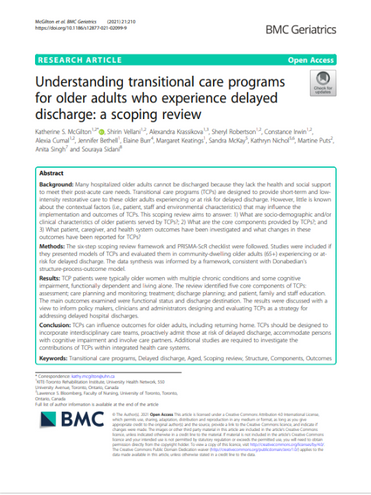Understanding transitional care programs for older adults who experience delayed discharge: a scoping review
Many hospitalized older adults cannot be discharged because they lack the health and social support to meet their post-acute care needs. Transitional care programs (TCPs) are designed to provide short-term and low-intensity restorative care to these older adults experiencing or at risk for delayed discharge.
Author: Katherine S. McGilton, Shirin Vellani, Alexandra Krassikova, et al.
Publication Date: March 29, 2021
Description: Many hospitalized older adults cannot be discharged because they lack the health and social support to meet their post-acute care needs. Transitional care programs (TCPs) are designed to provide short-term and low-intensity restorative care to these older adults experiencing or at risk for delayed discharge. However, little is known about the contextual factors (i.e., patient, staff and environmental characteristics) that may influence the implementation and outcomes of TCPs. This scoping review aims to answer: 1) What are socio-demographic and/or clinical characteristics of older patients served by TCPs?; 2) What are the core components provided by TCPs?; and 3) What patient, caregiver, and health system outcomes have been investigated and what changes in these outcomes have been reported for TCPs?
Access: Free
Keywords: transitional care programs, delayed discharge, aged,



